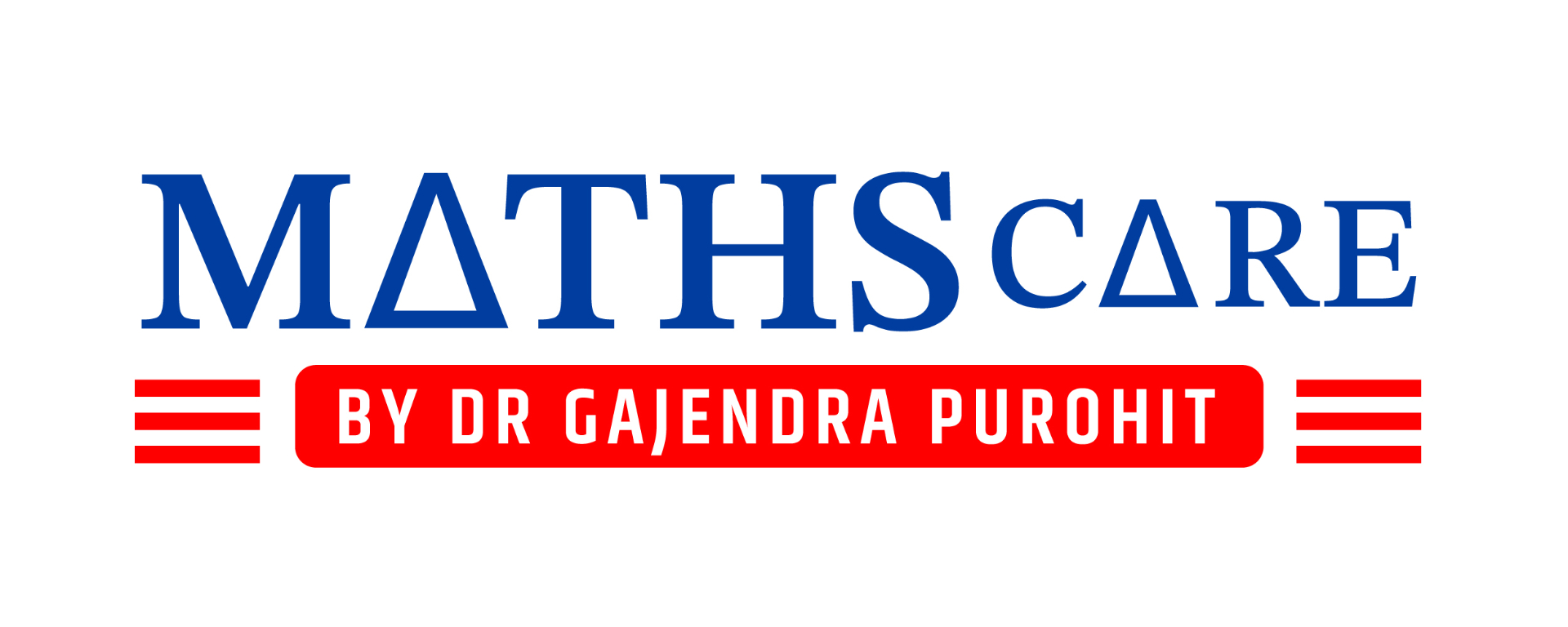IIT JAM 2025 Mathematics Competition
IIT JAM 2025 (Joint Admission Test for Masters): The IIT JAM (Joint Admission Test for M.Sc.) is a prestigious national-level examination conducted for students aspiring to pursue postgraduate programs in Mathematics and related fields. Each year, the exam sees increasing participation, making it one of the most competitive and sought-after entrance tests in India. IIT JAM 2025 is no exception, requiring candidates to engage in rigorous preparation and strategic planning to excel. This blog offers a detailed guide on the syllabus, eligibility, cutoffs, competition level, and preparation tips to help aspirants succeed in this challenging examination.
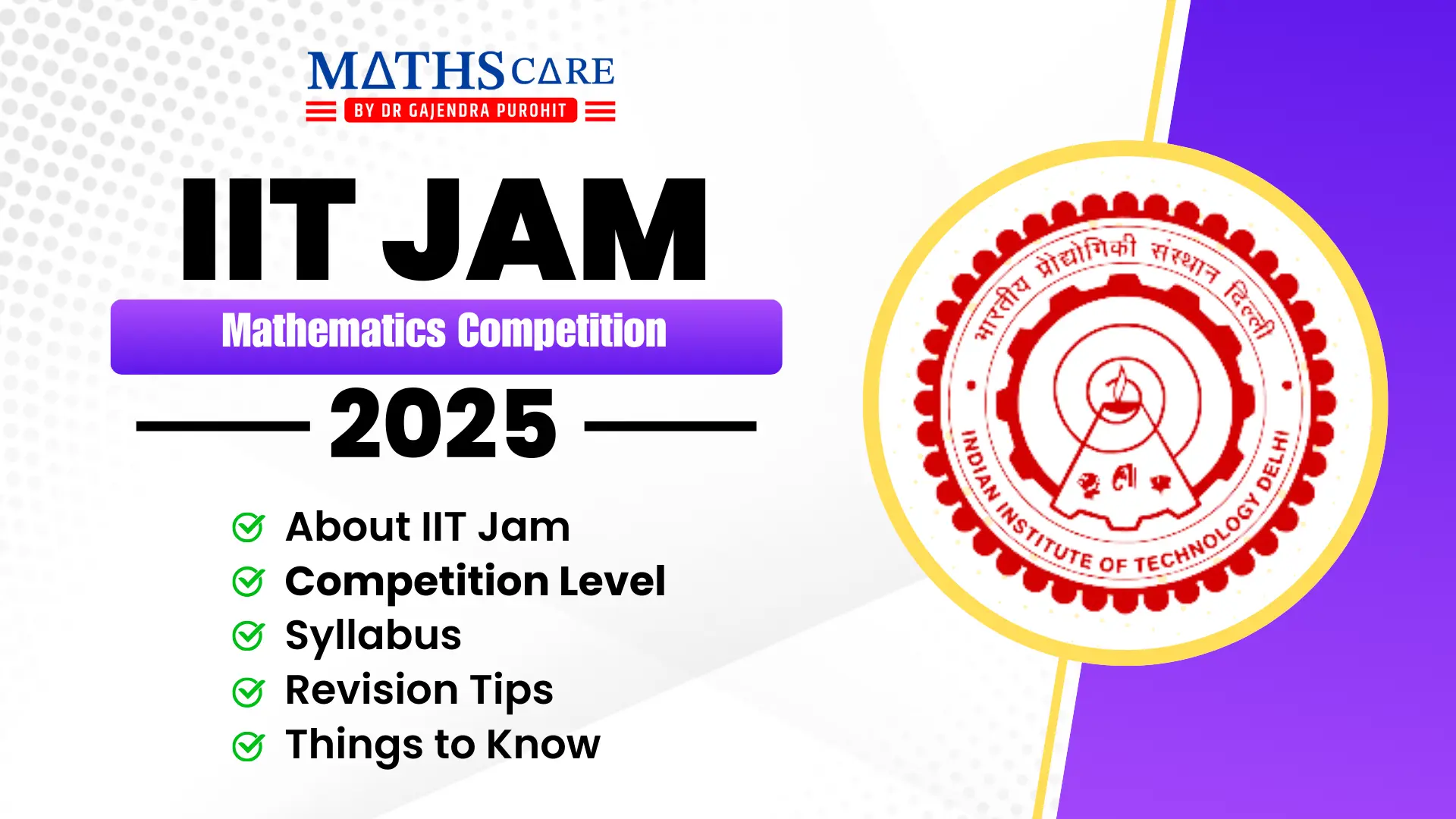
About IIT JAM
The IIT JAM is organized annually by one of the IITs on a rotational basis. It provides admission to M.Sc., Joint M.Sc.-Ph.D., and other postgraduate programs at IITs, IISc, NITs, and other esteemed institutions.
Key Features
Purpose: The exam promotes interdisciplinary studies and academic excellence in science, offering candidates a chance to excel in their chosen fields.
Organizing Institute: IIT Delhi is the organizing body for IIT JAM 2025, ensuring the smooth conduct of the examination across the country.
Programs Offered: The exam opens doors to M.Sc., Joint M.Sc.-Ph.D., and other postgraduate programs at premier institutes, providing unparalleled academic and career opportunities.
The IIT JAM has become a gateway to advanced education at India’s top institutions, fostering a culture of research and innovation. The exam has gained significant prominence due to its role in shaping future scientists, researchers, and academicians.
IIT JAM 2025 Syllabus
The Mathematics syllabus for IIT JAM 2025 is designed to test candidates’ conceptual understanding, analytical skills, and problem-solving abilities. It is divided into key topics:
Sequences and Series: Convergence of sequences, series tests, power series, and uniform convergence. These topics form the foundation of advanced mathematical analysis.
Importance: These concepts are fundamental for advanced topics like real analysis and functional analysis.
Preparation Tip: Focus on practicing various convergence tests and their applications.
Linear Algebra: Vector spaces, matrices, determinants, eigenvalues, eigenvectors, and linear transformations. This topic forms a significant portion of the exam and requires a deep understanding.
Application: Linear algebra is widely used in differential equations and computer algorithms.
Preparation Tip: Solve problems related to eigenvalue computation and transformations.
Calculus: Differentiation, integration, limits, continuity, sequences of functions, and improper integrals. This section tests both basic concepts and advanced applications.
Focus Areas: Emphasize improper integrals and applications of differentiation.
Preparation Tip: Practice solving integrals with multiple methods to build proficiency.
Differential Equations: First-order equations, higher-order linear differential equations, and Laplace transforms. Emphasis is on solving practical and theoretical problems.
Practical Relevance: These are used in modeling physical and engineering problems.
Preparation Tip: Focus on initial value problems and solving equations using Laplace transforms.
Real Analysis: Metric spaces, continuity, compactness, and functions of several variables. Candidates must grasp the fundamentals of analysis thoroughly.
Advanced Concepts: Learn proofs of key theorems to strengthen understanding.
Preparation Tip: Practice problems on continuity and compactness.
Group Theory: Subgroups, cosets, normal subgroups, and Lagrange’s theorem. This topic requires both theoretical and practical problem-solving skills.
Relevance: Group theory concepts are foundational in abstract algebra.
Preparation Tip: Solve problems on coset decomposition and Lagrange’s theorem.
Each topic demands focused preparation and consistent practice. Aspirants should dedicate sufficient time to understand the theoretical aspects and solve diverse problems to master these areas.
Exam Dates 2025
The official schedule for IIT JAM 2025, as announced by IIT Delhi, is as follows:
JAM Online Application Processing System (JOAPS) Website Opens: September 3, 2024 (Tuesday)
Candidates must visit the official website to register, fill in details, and upload required documents. Early registration ensures ample time to rectify any errors in the application.
Last Date for Closing Registration: October 18, 2024 (Friday)
The application window closes on this date. Applicants should avoid last-minute submissions to avoid technical issues.
Last Date to Change Examination Cities/Test Papers/Category/Gender: November 18, 2024
Candidates can make corrections or changes to their application details by this deadline. However, changes might incur additional charges.
To Upload a Valid OBC-NCL/EWS Certificate: November 20, 2024
Reserved category candidates must upload their latest valid certificates to avail category benefits.
Confirmation of Compensatory Time/Scribe Assistance: December 30, 2024
Candidates requiring special accommodations must confirm these arrangements by this date.
Availability of JAM Admit Cards on the Online Application Portal: January 6, 2025 (Monday)
Admit cards will be available for download. Candidates must print and carry their admit cards to the exam center.
Date of Examination: February 2, 2025 (Sunday)
The examination will be conducted in multiple sessions across various cities. Candidates must report to their designated centers on time.
Announcement of the Results: March 19, 2025 (Wednesday)
Results will be announced on the official website. Candidates can view their scores and ranks by logging in to their accounts.
Availability of Scorecards for Download: March 25, 2025 (Tuesday)
Scorecards will be available for download. They are necessary for the counseling and admission processes.
Portal for Admission Opens: April 2, 2025 (Wednesday)
The admission portal will be open for candidates to apply to their preferred institutes and programs.
Candidates must stay updated with the official website for any changes or announcements regarding the exam. Adhering to these dates is critical to ensure a smooth application process and avoid last-minute stress.
Eligibility Criteria
To be eligible for IIT JAM 2025, candidates must fulfill the following criteria:
Educational Qualification: A Bachelor’s degree with at least 55% aggregate marks (50% for SC/ST/PwD categories). The degree must be from a recognized university or institute. Candidates pursuing their final year of graduation can also apply, provided they complete their degree requirements by the specified deadline.
Focus: Candidates must ensure their undergraduate curriculum includes relevant subjects for their chosen test paper.
Age Limit: There is no upper age limit for IIT JAM, making it accessible to a broad range of candidates.
Accessibility: This allows aspirants from diverse educational backgrounds and professional stages to apply.
Nationality: Open to both Indian and foreign nationals, allowing a diverse pool of applicants.
Inclusivity: The exam caters to a global audience, emphasizing the importance of international collaboration in science.
Additional Requirements: Candidates must ensure their qualifying degree includes the specific subjects required for eligibility in their chosen test paper.
Documentation: All relevant certificates and documents must be submitted during the application and admission process.
Meeting these criteria is mandatory for participation in the examination and subsequent admission to the desired programs. Candidates must carefully review the eligibility requirements to avoid disqualification during the application process.
IIT JAM 2025 Cutoffs
The cutoff marks for IIT JAM vary each year based on factors such as the difficulty level of the exam, the number of candidates, and the availability of seats. The expected cutoffs for Mathematics in 2025 are:
General: 17.00 – 20.00
OBC-NCL: 15.50 – 17.00
SC/ST/PwD: 10.00 – 15.50
These cutoffs are indicative and may vary once the official results are declared. Aspirants should aim to score well above the cutoff to secure admission to their preferred institutes. A high score not only increases the chances of admission but also opens doors to top programs at leading institutes.
Competition Level
IIT JAM is known for its rigorous competition due to the limited number of seats and the increasing number of aspirants.
Participation Stats: In the 2024 session, approximately 15,000 candidates appeared for the Mathematics paper, competing for a limited number of seats.
Seat Availability: Around 500–700 seats are available for Mathematics across all participating institutes, making the competition fierce.
Difficulty Trends: Over the years, the exam has become more challenging, requiring candidates to have a strong grasp of fundamental concepts and advanced problem-solving skills.
Understanding the competitive landscape is essential for aspirants to set realistic goals and develop effective preparation strategies. Candidates must focus on consistent practice, time management, and conceptual clarity to excel in this competitive environment.
Admitting Institutes
The following institutes accept IIT JAM scores for Mathematics:
IITs: IIT Bombay, IIT Delhi, IIT Madras, IIT Kanpur, IIT Kharagpur, and others. These institutes offer M.Sc. and integrated Ph.D. programs.
IISc Bangalore: Offers Integrated Ph.D. programs in Mathematics and related fields, providing a strong research-oriented curriculum.
NITs: Selected National Institutes of Technology accept JAM scores for various programs.
CFTIs: Centrally Funded Technical Institutes also accept JAM scores for specific postgraduate programs.
Each institute has its own admission process, and candidates must review the specific requirements of their preferred institutes to ensure a smooth admission process. The diversity of programs available through IIT JAM makes it a highly appealing choice for postgraduate studies.
Tips for IIT JAM 2025
Tips for Revision:
Focus on Weak Areas: Allocate more time to topics where you lack confidence. Revisit concepts and practice related problems to build proficiency.
Create Summary Notes: Prepare concise notes summarizing key concepts and formulas. These notes can be invaluable during the final stages of revision.
Practice Mock Tests: Attempt past papers and mock tests under timed conditions to simulate the exam environment and improve time management skills.
Tips for Preparation:
Structured Study Plan: Divide the syllabus into manageable sections and allocate specific time slots for each. Consistency is key to covering the vast syllabus.
Reliable Resources: Use standard textbooks, online lectures, and practice materials for in-depth understanding and problem-solving.
Regular Self-Assessment: Evaluate your progress periodically to identify areas for improvement and adjust your study plan accordingly.
A disciplined and consistent approach can significantly enhance your chances of success in IIT JAM. Staying motivated and focused throughout the preparation journey is crucial.
Conclusion
IIT JAM 2025 is a golden opportunity for Mathematics enthusiasts to secure admission to some of the most prestigious institutes in India. The rigorous nature of the exam demands meticulous preparation, a thorough understanding of the syllabus, and effective time management. By staying focused and consistent, candidates can navigate the challenges of this competitive exam and achieve their academic goals. Stay updated with official announcements and begin your preparation early to maximize your chances of success.
With dedication and the right strategies, aspirants can turn their dreams of studying at India’s premier institutes into reality. Make the most of this opportunity and prepare to excel in IIT JAM 2025.
IIT JAM FAQS
JAM scores are primarily for Indian institutes, but you may need to check with international universities individually to see if they accept JAM scores.
You will know your exam center details once your admit card is released. Exam centers cannot be visited beforehand.
While JAM is primarily for science graduates, some interdisciplinary programs may accept students from related backgrounds. Check the eligibility criteria for the specific program you’re interested in.
To be considered under the PwD category, a minimum of 40% disability is required, as per the guidelines of the RPwD Act.
JAM 2025 will only be conducted in English. There is no option for regional languages.
BEST OFFERING COURSES FOR YOU
BEST BOOKS FOR IIT JAM/ CSIR-NET
BUY BOOKS ON OUR APP
RECENT POSTS
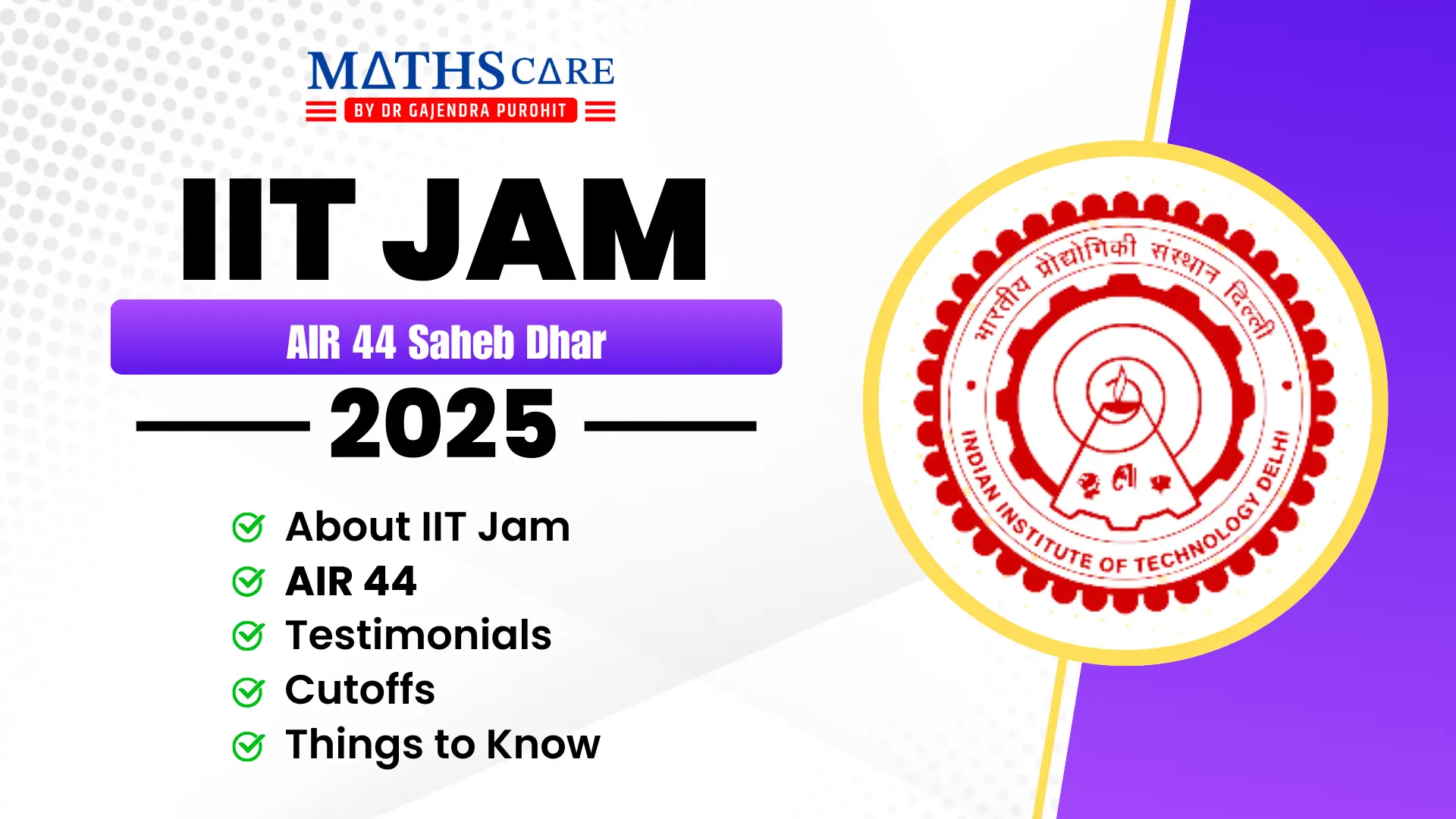
IIT JAM 2025 Topper: AIR 44 Saheb Dhar
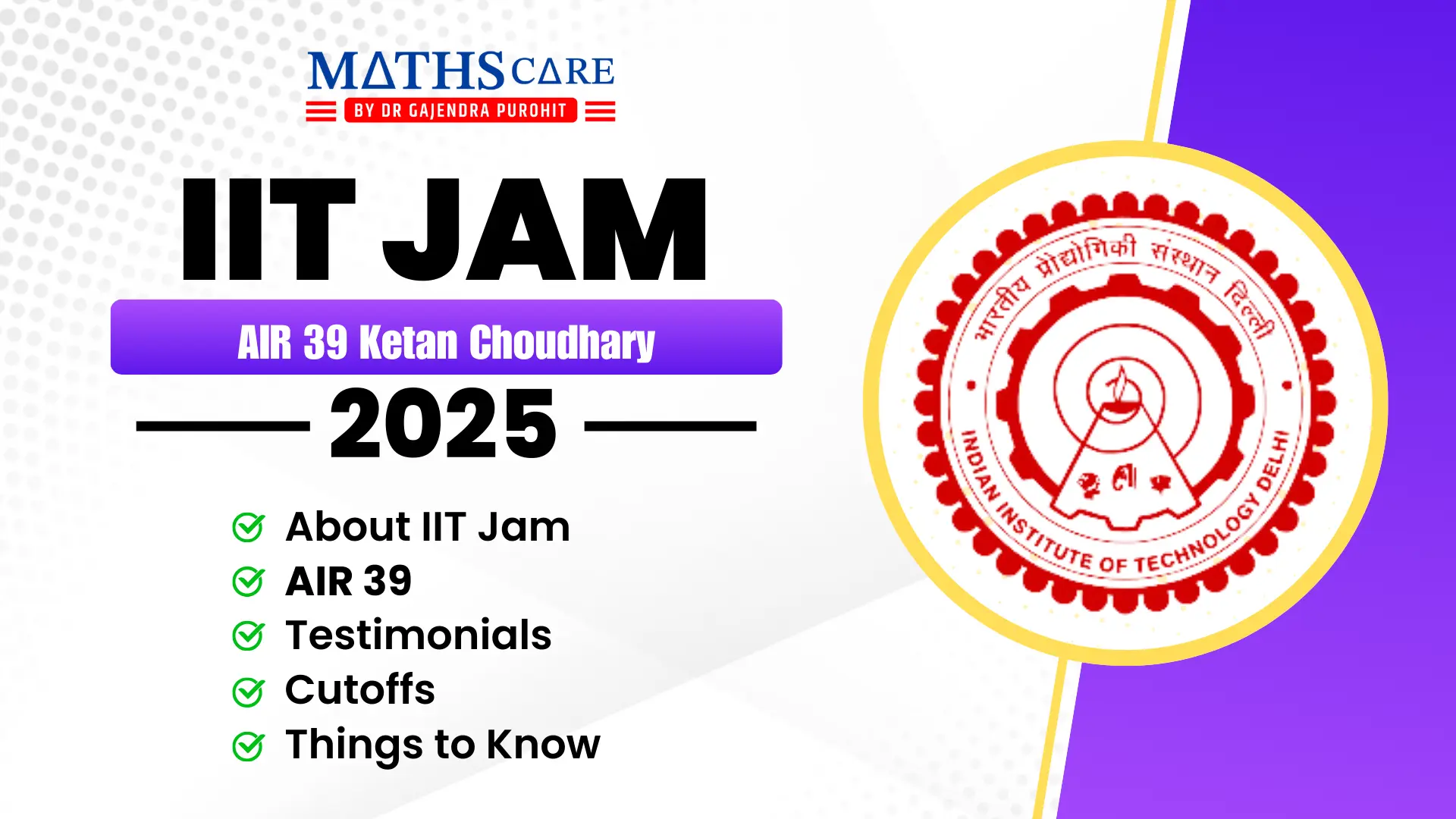
IIT JAM 2025 Topper: AIR 39 Ketan Choudhary
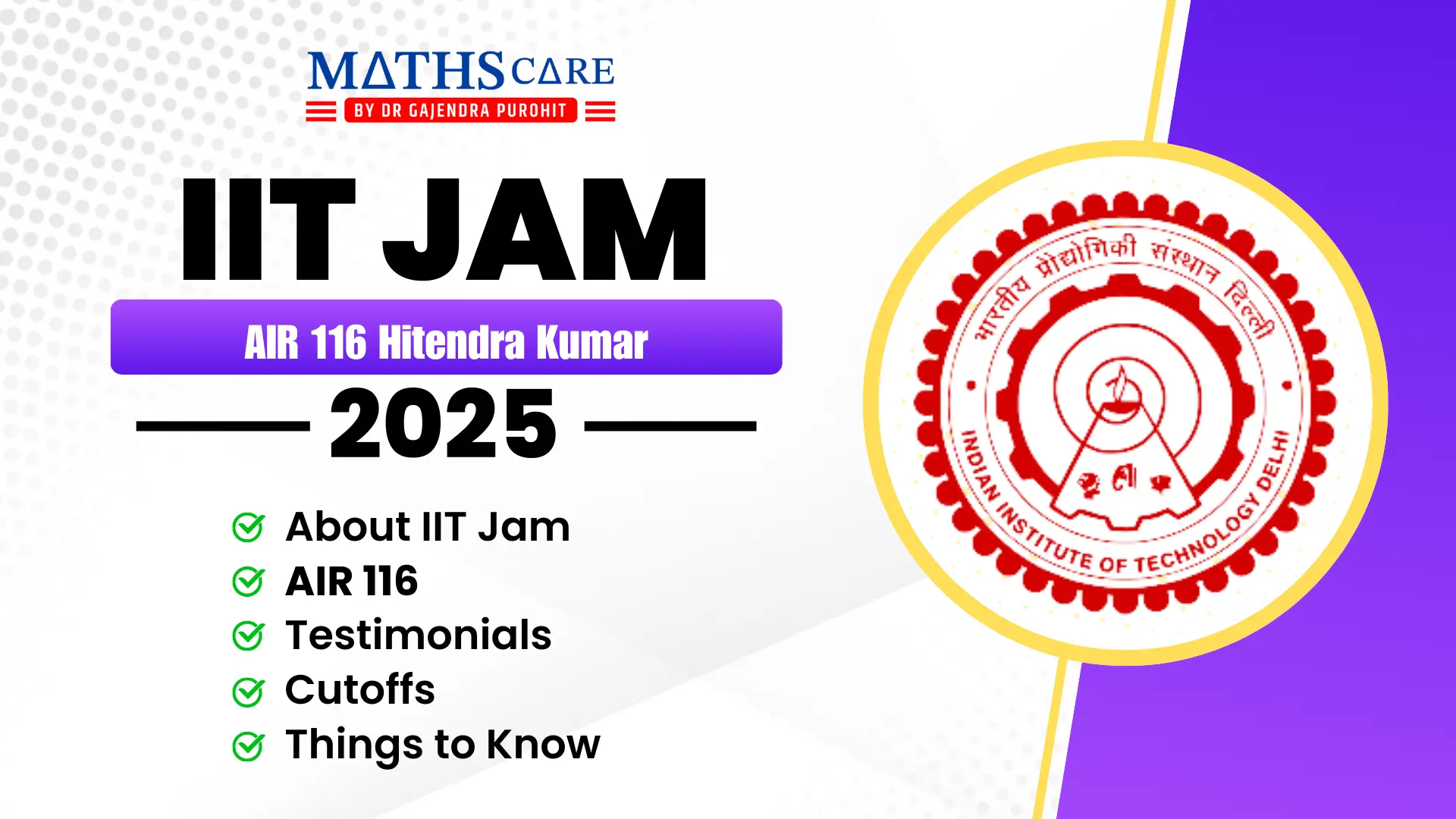
IIT JAM 2025 Topper: AIR 116 Hitendra Kumar
